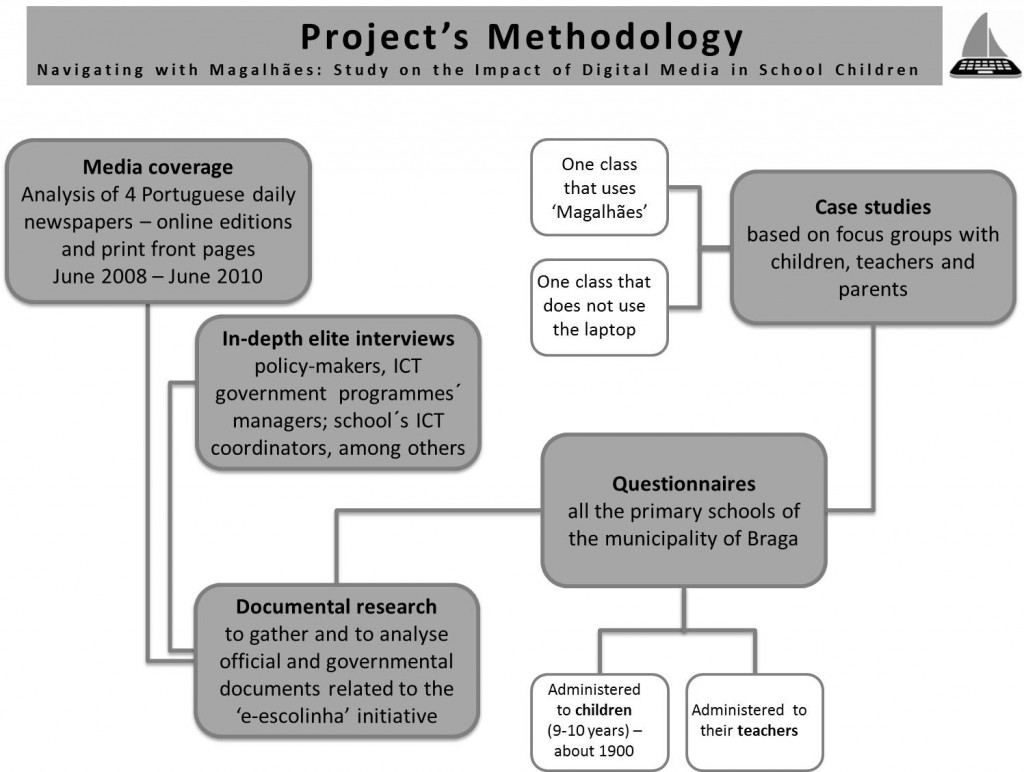1. Public discourses generated by the government and society
In this task we intend to analyse the economic and political aspects of this programme, attempting to understand the pragmatic reasons behind it. We will analyse in detail public discourses (speeches and written documents) about the ‘e-escolinha’ project, in general, and ‘Magalhães’, in particular. We expect to develop a deeper understanding about the main assumptions that have informed Portuguese government policy-making and ‘technological visions’ which has justified and legitimate this option. Basically, we will attempt to understand what effectively does the Portuguese government aim delivering ‘Magalhães’ at schools? How has the government presented the project to society? Has the government discursive approach any connection with media education or media literacy?
These goals will be accomplished using two different methods:
- documental analysis: the team will gather and critically analyse the existing documents on the issue, mainly the documents produced by the government and its critics. In addiction, it will also be part of the analysis the articles gathered in the press (four daily newspapers) in order to understand which perspectives and voices were broadcasted to the public opinion;
- in-depth elite interviews: to complement the data coming from the documental analysis, Information Society programmes’ coordinators will be interviewed.
2. Voices and perspectives in and outside the classroom
Children
It will be given a questionnaire to all the 4th grade students of all primary schools in the city of Braga. Through the questionnaire we want to answer to a set of research questions, namely: who are the children that are using ‘Magalhães’? And who are the children that are not using it? How are they concretely using the PC? What opinions have children about ‘Magalhães’? What do they like and dislike most? What are the advantages and the disadvantages they identify? How the relationship with this technology in particular is linked with other media’s uses?
Teachers
Based in the assumption that teachers should play a positive role in improving children’s access to media and in providing critical and creative ways and opportunities to use and to understand it, we want to address the following questions: To what extent are teachers using the laptop in their classrooms? What is the impact of ‘Magalhães’ in schools? How do they feel in using it: Reluctant? Constrained? Confused? Lost? Empowered? Engaged? What opportunities and what threats do they identify? Did ‘Magalhães’ bring changes on the learning process and on the way of communicating and participating? Are teachers contributing to
the development of children´s critical and creative abilities vis-à-vis new media? Are they ‘equipping’ students to understand and to critique these media or are they using them in a merely functional way? Are teachers aware of the range and diversity of young people’s experiences with media outside school? How do they handle this process? How do they evaluate this programme? Have teachers been consulted about it by government officials? Can teachers identify the pedagogic purposes of the project? Have teachers participated in training programmes to make the best use of ‘Magalhães’ with their students?
Parents or other persons responsible for children’s education
Through the creation of focus-group with students, teachers and parents it will be possible to develop our understanding about the digital gap between school and home and, perhaps more importantly, to explore news ways for closing this cultural and educational gap. Listening to the parents we want to understand what do they think – in depth – about the governmental initiative and how they evaluate its implementation. We will try to understand parent’s perceptions on risks and opportunities the digital media have to offer.





